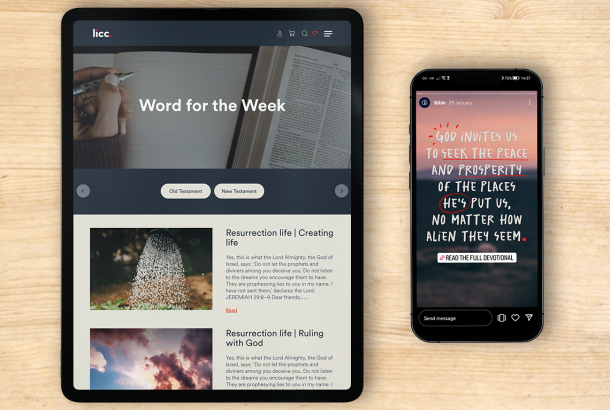Word for the Week
Short reflections on Bible passages, with a frontline focus...
Read
We are currently experiencing technical issues with some of our video content. If you are unable to access a video, please email [email protected] for help.
He asked them, ‘What are you discussing together as you walk along?’
They stood still, their faces downcast. One of them, named Cleopas, asked him, ‘Are you the only one visiting Jerusalem who does not know the things that have happened there in these days?’
‘What things?’ he asked.
LUKE 24:17–19
I have a friend who works as a journalist for a major news organisation. He asks the best questions of anyone I know. But I didn’t understand why until I started to see how Jesus used questions.
So, why does the Son of God – who literally knows people’s thoughts (Luke 5:22) – use questions?
After walking along with the Emmaus travellers for a while, Jesus simply asks them what they’re discussing. He doesn’t impose his agenda – he simply asks permission to join in the conversation they’re already having.
The travellers respond – exasperatedly – wondering if he is the only one who doesn’t know about everything that’s happened over the past days. Of course, Jesus knows better than anyone. And he still asks if they would tell him a little more.
Jesus isn’t on a fact-finding mission. He seems to be asking because he wants to hear how these travellers will narrate their own experience. He gives them the space to process their hurt, confusion, and longings in their own choice of words.
And this is what I experience when my journalist friend asks me a question.
His questions open me up, but not because he’s especially incisive or articulate, nor because he uses the right inflection – though he is and does. Instead, it’s because when he asks me a question, I don’t feel like I’m being interrogated. I feel as if someone is genuinely curious about how I might narrate my own experience. He is genuinely curious about me.
We can practise that kind of curiosity with our colleagues, customers, and congregants. When they share how their weekends were, that they saw a great film last night, or how busy they are, we might ask what meant most to them, what they made of the characters, or what stops them from slowing down.
The author Andy Crouch puts it like this:
‘Brew coffee or tea, sit with a friend and ask them questions – questions just one step riskier than the last time you talked. As you listen, observe the flickers of sadness or hope that cross their face. Try to imagine what it must be like to live their story, suffer their losses, dream their dreams.’ (Strong and Weak: Embracing a Life of Love, Risk, and True Flourishing, p. 91)
This isn’t about using questions to manipulate a conversation and get it somewhere we want it to go. This is a Jesus-inspired curiosity that transforms not just our conversations, but our relationships – one question at a time.
—
Tim Yearsley
Head of Innovation, LICC
What question you can ask someone on your frontline that’s a little riskier than what you’ve asked before? Join the conversation below.

Short reflections on Bible passages, with a frontline focus...
Read

Now that same day two of them were going to a village called Emmaus, about seven miles from Jerusalem. They were talking with each other about everything that ...
Read

As he neared Damascus on his journey, suddenly a light from heaven flashed around him. He fell to the ground and heard a voice say to him, Saul, Saul, why do...
Read
| Cookie | Duration | Description |
|---|---|---|
| __stripe_mid | 1 year | This cookie is set by Stripe payment gateway. This cookie is used to enable payment on the website without storing any patment information on a server. |
| __stripe_sid | 30 minutes | This cookie is set by Stripe payment gateway. This cookie is used to enable payment on the website without storing any patment information on a server. |
| _GRECAPTCHA | 5 months 27 days | This cookie is set by Google. In addition to certain standard Google cookies, reCAPTCHA sets a necessary cookie (_GRECAPTCHA) when executed for the purpose of providing its risk analysis. |
| cookielawinfo-checkbox-advertisement | 1 year | The cookie is set by GDPR cookie consent to record the user consent for the cookies in the category "Advertisement". |
| cookielawinfo-checkbox-analytics | 11 months | This cookie is set by GDPR Cookie Consent plugin. The cookie is used to store the user consent for the cookies in the category "Analytics". |
| cookielawinfo-checkbox-functional | 11 months | The cookie is set by GDPR cookie consent to record the user consent for the cookies in the category "Functional". |
| cookielawinfo-checkbox-necessary | 11 months | This cookie is set by GDPR Cookie Consent plugin. The cookies is used to store the user consent for the cookies in the category "Necessary". |
| cookielawinfo-checkbox-others | 11 months | This cookie is set by GDPR Cookie Consent plugin. The cookie is used to store the user consent for the cookies in the category "Other. |
| cookielawinfo-checkbox-performance | 11 months | This cookie is set by GDPR Cookie Consent plugin. The cookie is used to store the user consent for the cookies in the category "Performance". |
| resource_download_valid | 30 days | This cookie is used to track whether or not you are able to download a resource. |
| viewed_cookie_policy | 11 months | The cookie is set by the GDPR Cookie Consent plugin and is used to store whether or not user has consented to the use of cookies. It does not store any personal data. |
| woocommerce_cart_hash | woocommerce_cart_hash | This cookie is used to store your basket information and is required to buy items from our website. |
| woocommerce_items_in_cart | session | This cookie is used to store your basket information and is required to buy items from our website. |
| wp_woocommerce_session | session | This cookie is used to store your basket information and is required to buy items from our website. |
| Cookie | Duration | Description |
|---|---|---|
| _ga | 2 years | This cookie is installed by Google Analytics. The cookie is used to calculate visitor, session, campaign data and keep track of site usage for the site's analytics report. The cookies store information anonymously and assign a randomly generated number to identify unique visitors. |
| _gcl_au | 3 months | This cookie is used by Google Analytics to understand user interaction with the website. |
| _gid | 1 day | This cookie is installed by Google Analytics. The cookie is used to store information of how visitors use a website and helps in creating an analytics report of how the website is doing. The data collected including the number visitors, the source where they have come from, and the pages visted in an anonymous form. |
| vuid | 2 years | This domain of this cookie is owned by Vimeo. This cookie is used by vimeo to collect tracking information. It sets a unique ID to embed videos to the website. |
| Cookie | Duration | Description |
|---|---|---|
| IDE | 1 year 24 days | Used by Google DoubleClick and stores information about how the user uses the website and any other advertisement before visiting the website. This is used to present users with ads that are relevant to them according to the user profile. |
| NID | 6 months | This cookie is used to a profile based on user's interest and display personalized ads to the users. |
| test_cookie | 15 minutes | This cookie is set by doubleclick.net. The purpose of the cookie is to determine if the user's browser supports cookies. |
| VISITOR_INFO1_LIVE | 5 months 27 days | This cookie is set by Youtube. Used to track the information of the embedded YouTube videos on a website. |
| YSC | session | This cookies is set by Youtube and is used to track the views of embedded videos. |
I’m so inspired by this devotional because it shows that when we’re present with our friends or work-mates, it allows their guard to drop a little more. This is a confirming word because just last week, I had an impromptu lunch date with a work-mate, and just through the course of talking and having lunch, and going through photos and the such – she started to open up with personal struggles, and I let her share, and I asked questions along the way which helped her to open more. It was such a precious moment because I was not judging her, or making her feel “less than” but allowing her to bear her heart. And now there’s more trust between myself and her, which I know Jesus created, bringing her just one more step closer to Him than the week before. Thank you for writing this. I live in Rockwall, TX USA, and I’m blessed by this ministry! Thank you for all you do for the Christians working in the corporate world!
This look at Jesus, on the walk to Emmaus, is a very timely input to me and one of my small study groups, as we have just recently be challenged, from the study of Malachi, about how to speak about Jesus with neighbours who are expressing an interest in our activities/life, or who are close relatives with particular issues at the moment, and so we have questions on how to do this well.
I will be using this with them. Thank you again for the resources LICC provide by its current outlets.